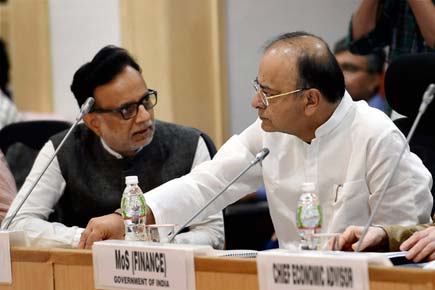The GST Council on Sunday unanimously agreed on a July 1 rollout of the Goods and Services Tax regime despite some pending issues, while relaxing the return filing deadline for the first two months, and approved the rules on anti-profiteering to prot


Union Minister for Finance and Corporate Affairs Arun Jaitley and Revenue Secretary Hasmukh Adhia at the 17th GST Council Meeting at Vigyan Bhawan in New Delhi. Pic/AFP
ADVERTISEMENT
The GST Council on Sunday unanimously agreed on a July 1 rollout of the Goods and Services Tax regime despite some pending issues, while relaxing the return filing deadline for the first two months, and approved the rules on anti-profiteering to protect consumers.
While Union Finance Minister Arun Jaitley, making these announcements, said India does not have the "luxury of time" to defer implementation of the new indirect tax regime, stakeholders hailed the Council's decision to give the initial two-month relaxation in filing of returns.
"The GST Council categorically agreed on the implementation of GST from July 1," Jaitley told reporters here after the penultimate meeting of the Council before the single pan-India GST is officially rolled out on the midnight of June 30, replacing the existing myriad central and state levies on both goods and services.
"A number of companies and trades have been raising the issue of the lack of their own preparedness. We do not have the luxury of time to defer implementation of GST," he said, announcing that the next meeting of the Council headed by him would be held on June 30.
Regarding the government's preparedness, Jaitley noted that over 80 per cent registered entities have already received their provisional GST registrations.
"If you take from the old system of registrations, then there are 80.91 lakh assessees, of whom some will get excluded. Registrations are going on satisfactorily and 65.6 lakh have already taken provisional registration, which is good enough to file returns," he said, adding that some new trades will come under the GST for the first time.
In this connection, the Finance Minister said the Council has allowed businesses a relaxation of time for the first two months (July-August) for filing their returns. These would also need to submit only a simple declaration initially, and would have time to furnish the exact "invoice-by-invoice data" later.
The Council also approved the structure and rules relating to an anti-profiteering authority (APA)
"We want to keep it as a deterrent and hope we are not compelled to use the APA," the Finance Minister said.
Revenue Secretary Hasmukh Adhia said that under the proposed APA, a company can be asked to roll-back the price and also refund an amount equal to what it has made through the hike in prices.
"It will have a sunset clause of two years," Adhia said.
The GST Council on Sunday also decided on a two-slab structure for taxing lottery tickets, which Jaitley said proved to be a contentious issue.
While state-run lotteries will be taxed at 12 per cent under the GST, state-authorised private lotteries will attract tax at the highest rate of 28 per cent.
The Council deferred a decision on e-way bills due to lack of consensus, which means states which have an e-way bill structure in place can continue with it, while others are exempt.
"Till a consolidated rule is framed by consensus, the transient rule will continue," Jaitley said on the e-way bill issue.
E-way bill is an electronic way bill for movement of goods which can be generated on the GST Network (GSTN) portal. Movement of goods of more than Rs 50,000 in value cannot be effected by a registered person without an e-way bill.
Briefing reporters earlier during a pause in the meeting, Andhra Pradesh Finance Minister Yanamala Ramakrishnudu said he has requested that textiles and fertilisers be exempted from the GST.
The Council also considered the revision of tax on hotel rooms and decided that while those in the range of Rs 2,000-Rs 7,500 a day tariff would face 18 per cent tax, rooms with daily tariff above Rs 7,500 would be taxed at 28 per cent. Restaurant service in five-star hotels would attract 18 per cent tax, Jaitley said.
He revealed that only three states -- Tamil Nadu, Punjab and Jammu and Kashmir -- were still to complete their necessary legisaltive formalities for implementing the GST regime.
Hailing the GST Council's decision to give initial two-months' relaxation in filing of returns, various stakeholders said the move will give ample time for the businesses to prepare their IT systems and comply with the new indirect tax regime.
"It will give more time to traders to prepare themselves to comply with GST law," the Confederation of All India Traders (CAIT) said welcoming the announcement by the Finance Minister.
Pratik Jain, Partner and Leader Indirect Tax, at PwC India, said: "Relaxation of time for filing initial invoice-wise returns is a welcome move which, to some extent, allays fears of readiness both from Goods and Services Tax Network (GSTN) and industry's point of view."
Ansh Bhargava, Senior Consultant, Taxmann.com said: "It is a welcome decision by the GST Council on the filing as it would allow taxpayers to get accustomed and adapt to the new system of taxation."
Rajeev Dimri, Leader, Indirect Tax, BMR and Associates LLP, said: "This measure should significantly help in assuaging the concerns of inadequate readiness of GSTN being faced by the industry and confirms that preparedness of GSTN will not be a roadblock for the implementation of GST as was being anticipated by the industry."
 Subscribe today by clicking the link and stay updated with the latest news!" Click here!
Subscribe today by clicking the link and stay updated with the latest news!" Click here!






